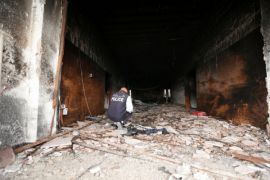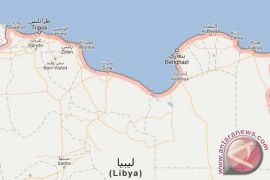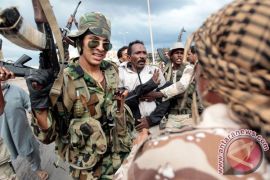The all white-painted mosque, standing grandiosely on the right side of the Jagorawi expressway connecting Jakarta and Bogor, draws thousands of faithful people almost every Sunday for the dzikir (prayers) led by famous cleric Muhammad Arifin Ilham.
The three-storey mosque, which also houses the Qaddaffy Islamic Center, was inaugurated on July 26, 2009 by Dr. Din Syamsuddin, general chairman of the Muhammadiyah organization. The maintenance and management of the mosque is carried out by the Az-Zikkra Foundation led by Ilham.
The bombings on Libya by the Western coalition in the last two weeks did not seem to affect people from coming and joining the dzikir rituals at the mosque, with many of them coming from outside Jakarta and many other places.
But the Western coalition attacks on Libya, codenamed operation Odyssey Dawn, has apparently been disturbing Indonesian Muslims in general.
"The coordinated military attacks on Libya by the U.S.-led NATO forces were launched to control its oil reserves instead of motives of humanity in the oil rich country," said Said Aqil Siradj, Nahdlatul Ulama (NU) chair at joint press conference with the Indonesia-Libya Friendship Institute (LPIL) here last Wednesday (March 23).
The NU is the largest Islamic organization in Indonesia with more than 40 million members nationwide.
"(They don`t throw bombs) on Israel and Palestine because (they don`t) have (abundant) oil reserves. But Libya is the world`s biggest oil supplier," Siradj said, adding that Libya was also known to possess huge oil reserves, something that may give an explanation to the attacks by those major powers which apparently aim to take control of those oil resources.
He was of the view the attacks by the Western coalition were a fatal mistake made on the pretext of protecting the interests of Libya`s civil population.
Siradj urged the government to wield its free and active foreign policy to show its stance and must not support violence committed against Libya. "So, the government of Indonesia should firmly use its lobbying power to take part in handling this issue," he said.
In an earlier and more formal stance, conveyed by NU Secretary General, Iqbal Sullam, the organization said it would be better if the Arab League stepped in to help solve the crisis in Libya.
He deplored the involvement of foreign legions in the crisis which was one of the reasons why a lot of people had been killed. "NU rejects any foreign intervention in Libyan political uproar despite resolution of the United Nations," Sullam stressed.
Control of oil
A rejection of the attack has also been voiced by Indonesian legislator from Commission I that deals among other with foreign affairs issues, Nurhayati Ali Assegaf.
Assegaf said that Libya is known to possess huge oil deposits something that may give an explanation to the attack by those major powers.
She also deplored the attack by the coalition powers that has taken so many civilian lives. The attack was launched under the name of protecting civilians, but different things have happened in Palestine.
"If the attack has been a form of protection for the civilian population in Libya, then why it is just Libya that has been made a target of those massive attacks? What about Israel which kills the Palestinian people every day?" she asked.
"The attack is totally wrong and the United Nations should have been fair on this matter," she emphasized, adding that the Western coalition should be responsible for the civilian victims killed in red zones.
"The U.N. has made a mistake in this regard and the attack launched by the coalition forces has not been a form of protection for the civilian population in Libya," she said, adding that there could have been a hidden reason behind the attack.
Not all the condemning voices have come from the Muslim quarters of the country anyway. The nationalist-Christian political party, the Indonesian Democratic Party Struggle (PDI-P), through its Defense and Foreign Affairs Committee, has also conveyed a formal position over the situation in Libya.
PDI-P Committee Chair on Defense and Foreign Affairs Andreas Hugo Pareira said in a press conference in Jakarta on Wednesday (March 23) that the attacks launched on Libya by European countries and the United States had something to do with oil.
Pareira added that the attacks were closely connected to the interests of the European countries and the United States for the oil possessed by Libya. They have a long-term target of controlling flow of oil from Libya in a possibly post-Qadaffy Libya.
"Therefore the interventions by the U.S., France, Italy under the umbrella of humanitarian operations have only been a mere pretext. The main reason remains for the control of oil and oil supply security to those countries," said the PDI-P politician.
Pareira even gave his opinion about the Libyan leader by saying that for Qaddafy the struggle has been a point of no return. His revolutionary spirit and his Bedouin desert combat power would remain high despite the massive bombardments.
International law
Pejambon, nickname of the Indonesian Foreign Affairs Ministry, seems also to have also expressed its disappointment over the developments in Libya, despite the fact that it is among the first countries to give a consent for the UN-sanctioned no-fly zone on Libya this month. Indonesia, however, has contained its controlled wrath inside a velvet package.
"Throughout the course of the recent developments in Libya, the Government of the Republic of Indonesia has consistently called for protection by the international community, consistent with the principles of international law and the Charter of the United Nations, of innocent civilians who have fallen victim of the unchecked violence," the Pejambon says in a formal statement last Monday (March 21).
A strict implementation of Security Council Resolution 1973 adopted last 17 March 2011 offers the potential for such protection of innocent civilians, it adds.
The Government of Indonesia emphasizes that ultimately, however, there is an urgent need for the promotion of conditions conducive for a peaceful, democratic political process in Libya to avoid violence and conflicts, for the people of Libya to be able to decide on their own democratic future.
(T.KR-VFT/H-NG/H-YH)
Reporter: by Vicki Febrianto
Editor: Priyambodo RH
Copyright © ANTARA 2011



